-
Featured News
The MC5: A Eulogy
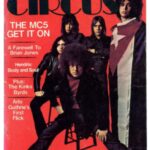 By Doug Sheppard
And then there were none. Five equals zero. The morning of May 9, 2024, the last surviving member of the MC5, drummer Dennis Thompson, died while recovering from a heart attack—
By Doug Sheppard
And then there were none. Five equals zero. The morning of May 9, 2024, the last surviving member of the MC5, drummer Dennis Thompson, died while recovering from a heart attack— -
Featured Articles
The Beatles: Their Hollywood and Los Angeles Connection
 By Harvey Kubernik
JUST RELEASED are two new installments of the Beatles’ recorded history, revised editions of two compilation albums often seen as the definitive introduction to their work.
Or
By Harvey Kubernik
JUST RELEASED are two new installments of the Beatles’ recorded history, revised editions of two compilation albums often seen as the definitive introduction to their work.
Or -
KOMINTERN (SUITE) by Komintern
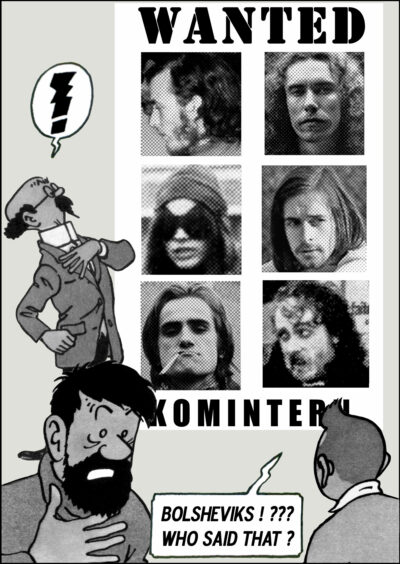
Ugly Things gives the floor to the band, who expressed the wish to complete and clarify the information provided in Issue #56
For Olivier Zdrzalik, Michel Muzac and Pascal Chassin, the adventure starts in summer 1969, when Olivier and Michel—who are cousins, used to play guitar together and to go on holiday together—decide to leave for Ibiza and Formentera (Balearic Islands, Spain), one of the European authentic hippy underground destinations. But the day of the sea crossing the boat serves only Menorca and Mallorca, where they meet Pascal in a party: as he is playing guitar alone Michel starts spontaneously jamming on harmonica with him. They will meet again totally by chance a first time in Ibiza where Pascal went separately and, back to Paris, a second time in a record store. It is how all three become friends and start rehearsing together with their three guitars.
For Francis Lemonnier (saxophone) and Serge Catalano (drums) another adventure had started in May 1968, when their newly formed band Red Noise, with the guitarist Patrick Vian, used to play its music within the well known Parisian university “La Sorbonne”, which was occupied by striking students, as factories will be occupied later by striking workers. Revolt rumbled and Red Noise stirred up passions with the violence of its music: the sound and the fury!
Red Noise split in spring 1970 because of political and musical disagreements. Patrick believes that music is revolutionary in itself and is a sufficient means of expression, as opposed to Francis and Serge who believe that words and lyrics are essential to expose the feelings and the political thoughts of this troubled period. So, in May 1970, both find themselves looking emergency for musicians, having a tour sheduled soon as support act for the English band East Of Eden, very popular in France at that time.
They meet Olivier, Michel and Pascal following an ad, in their rehearsal space that they call “the blockhaus” because of the incredible acoustic reverberation of the place. After a furious jam, (which will become later one of the tracks of the Komintern’s album: “Petite Musique pour un Blockhaus”) the formation of the band is decided and thereafter Olivier, who has an excellent rhythmic sense, will play bass guitar.
As it’s not possible to keep the name Red Noise, Francis and Serge choose the name Komintern with Philippe Constantin, artistic director of the record company Pathé- Marconi that promotes East Of Eden in France, with whom they maintain friendly relations.
After only a few rehearsals, and with only its long jam and some variations, Komintern starts performing on May 25, 1970, on the big stages of the “Maisons de la Culture” (kind of theaters dedicated to cultural events) in big cities, and first in Paris… suicidal and heroic tour during which they receive mixed reactions from the audience.
Relations are sometimes strained and there are heated discussions between Serge and Francis on one side, and Olivier, Pascal and Michel on the other because, if all three had also shared the ideals of May 1968 and had been moved by the speech explosion, the revolutionary creativity and the anarchist and festive aspect of the events, and if they are politicized, they however don’t adhere to the sectarian and dogmatic aspects of the radical “classic” leftists, Trotskyists or Maoists. They are more interested in California counterculture and in UK psych-rock music (Pink Floyd, Soft Machine, Led Zeppelin, King Crimson…), as well as in environmental concerns and emerging ecology (mainly in US). As for Serge, he is very involved in political militancy and close to the Communist League, and Francis largely shares his ideas at that time.
After the chaotic tour with East Of Eden has ended, the flute and saxophone player Jean- Michel Berté, whom Pascal had met, joins Komintern, and the band leaves soon to perform at some of the summer Pop Festivals in South France (Valbonne, Aix-en-Provence and Biot). There, it’s the total chaos: most festivals had been initialy banned and cancelled, lot of scheduled bands don’t come, other ones come, the audience claims free, many kick down barriers and enter without paying, and organizers and security staff are overwhelmed. Komintern plays its concerts, most of the time without sound check, participates in jams, harangues the crowd.
In Aix-en-Provence the band, who is not welcome, takes the stage in afternoon to mention the victory of young people who managed to enter for free in the festival enclosure and to protest the entry’s cost. It will be subjected to physical threats and scheduled last, that means early morning when almost everyone is gone or asleep. The press will comment that Komintern’s members, “that look like ghosts at this hour”, give “a political recital” during which Olivier, who wear a skull mask – he would have liked the caricature of a decadent bourgeois but he didn’t find such a mask – declared: “The bourgeoisie is afraid of gatherings of young people, it is right to be afraid because a new generation of revolutionaries is born that will continue the struggle of May-June 1968”.
Having sympathized during the festivals with members of another band in the same line, Maajun, who live together in a house in the distant suburbs, Komintern starts rehearsing seriously in the basement of this house, converted into a rehearsal space. Time has come to structure the free-pop agitation of the band, and it is in this basement that the long suite “Bal pour un Rat Vivant” is composed. Over the rehearsals the musical collage system, that will differentiate Komintern from the other bands of this period, happens in a natural and spontaneous way.
|
|
At the same time the idea of creating the F.L.I.P. (Force for Liberation and Intervention in Pop) was born, mainly at the initiative of Alain Roux, one of the Maajun‘s singers, who will write the manifesto, a situationist inspired text, that will be signed by Komintern, Fille Qui Mousse, Maajun et Dagon: “A certain number of us in the Pop want to learn the lessons of the Pop summer /…/ Festivals have showed the strength of the Pop movement among young people /…/ For them the Pop is something else than a business, it’s a new way of life which necessarily begins with the radical protest of bourgeois society, of its laws, of the alienation it causes /…/ So we decided to take the initiative: as of now Pop will not be a good or less good quality commodity, it will be the way of our revolt against the Old World, a subversive weapon for changing life and transforming world here and now, that means everywhere that struggles are conducted. /…/”.
Jean-Pierre Lentin, bass player of Dagon and journalist for the counterculture magazine Actuel will write with humour:
“Bands of the F.L.I.P. meet on friday evening in the “Quartier Latin”, where it is spoken loudly about revolution, after which the practice is minimal. Pop musician is far for being an exemplary militant. The prospect of getting up early and handing out flyers doesn’t fill him with enthusiasm”…
Anyway, Komintern and the other signatory bands will play concerts and take the floor for free in several faculties and other places, on strike or not…
But Pop music will not be freed from the grip of recording industry.

Concert at the University Dauphine (Paris) with the bands of the F.L.I.P.
In October Komintern plays within the setting of the first European John Cage‘s Musicircus, in November for a radio show, and then Jean-Michel Berthé left the band, that he never had really integrated. In December the band plays within the setting of a benefit concert in support of political Latin American prisoners with Kevin Ayers and The Whole World, and then to The Piblokto, which was the “British connexion’s place” in North France, where we feel as if we had crossed the channel, and where played Deep Purple, Black Sabbath, Cat Stevens, and of course Pete Brown & Piblokto who gave the name to the place.
The Komintern’s poster (see issue # 56) is designed by a friend of the band, Phillippe Rivemale, who goes to an Art School and will become a painter. He uses the well known photo of the medal presentation to the US runners Tommie Smith and John Carlos, winners at the Olympic Games of Mexico in 1968, black-gloved fist raised as a sign of rallying to the Black Power, poster which symbolizes the struggle against all oppression, including of course the bureaucratic bolshevic oppression.
In January 1971 Komintern is scheduled at the festival Pop’Lorraine in Nancy (North-East of France, about 300 km from Paris). It is the first French festival after the Pop festivals of the summer 1970, which is curiously organized for the benefit of joyless children’s Christmas, but after Christmas… A lot of well known artists and bands participate in this event: Richie Havens, Soft Machine, Pete Brown & Piblokto, Gong, Dynastie Crisis, Triangle, Les Variations, etc, and l’Open Light Show with which Komintern wants to agree to project slides the time of its concert.
On the way to Nancy the snow starts to fall and the band stops for lunch in a roadside restaurant. Its entry throws a chill in the audience: macho truck drivers, some of whom dancing to the sound of a jukebox with provincial and vulgar-looking women, rubbing against them and putting their hands on their buttocks.
Komintern’s members are themselves accompanied by a friend, a pretty girl who seems straight out of the Chelsea’s boutique “Granny Takes a Trip”, and with their long hair and their freak looks they don’t stick to the decor. However they sit down.
Tension rises and the atmosphere becomes electric with bad looks in their direction. A woman who calls herself a nurse says that if they had a car accident she wouldn’t treat them, and she urges her friends, who are of course much bigger and stronger than them, to beat them up. So, a waiter comes to tell them that they had better leave the place quickly, what they do… Easy Rider‘s episode French style!
Arriving in Nancy the band discovers the exhibition center, a sort of huge concrete hangar, and it tries to agree with the guys of the Open Light Show to have its slides integrated into their light show, which is not easy without prior preparation. After some projection tests it is therefore decided that the slides would be projected on a large wall.
Like in Aix-en Provence for the Progressive Music festival Komintern must play last. It not by accident. The band has its reputation as “dangerous protesters” and its slides, mainly detourned pictures and photos in a situationist spirit, are very provocative.
At first everything seems to go well and bands begin to play before there are seven power cuts, before Les Variations have incomprehensible sound’s problems and have to restart their concert three times… And suddenly it’s midnight and the sound engineers have finished working… Komintern will not play tonight! Moreover they had an amp stolen!
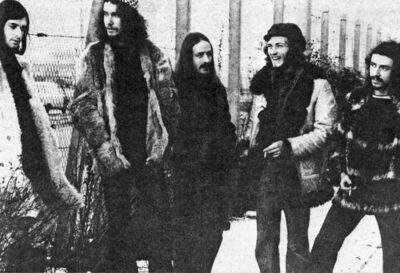
Francis Lemmonier, Pascal Chassin, Michel Muzac, Serge Catalano and Olivier Zdrzalik in the snow in Nancy.
After not having performed in Nancy, Komintern writes a text entitled “Fuck the Power in Pop”, which denounce the exploitation of Pop Music in order to channel the revolutionary appetite of youth, and will be published in the newspaper Le Pop.
In late January 1971, the violinist Richard Aubert, that Michel had seen on stage with the band Fille Qui Mouse, joins Komintern after they has met. So, the band which will record the album is now formed:
- with Francis, the soul of Komintern with his free, wild, violent, parodic and ironic music which makes the whole originality of the band, and who likes Albert Ayler, Eric Dolphy, John Coltrane (Black free-jazz American musicians have a significant influence on French underground musicians, especially since many live in France like Antony Braxton, Don Cherry, Archie Shepp, etc…) ;
- with Serge, a particularly explosive drummer whose model is Elvin Jones, active in writing texts and in interviews ;
- with Pascal, Olivier and Michel who particularly like Captain Beefheart, The Mothers Of Invention and Soft Machine in the context of this musical meeting ;
- with Richard who plays at the same time rock with his violin (a bit like Dave Arbus in East Of Eden) and jazz in the same spirit as Jean-Luc Ponty, and brings an acid-folk and “classic” touch to the band.
Komintern will give some concerts, including two ones in relation to the commemoration of the Commune de Paris in march 1971, the first one perched on a truck during a wild demonstration stopped by the police, the musicians have just the time to take their instruments and run away (except of Patrick Vian of Red Noise), the second one at a wild party in a prestigious school where students rob and drink the very expensive wine cellar… scandal which will get huge media attention.
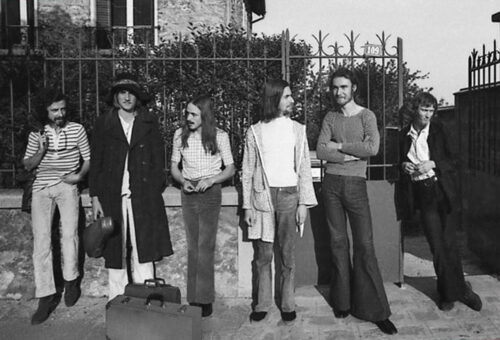
All together at Maajun’s place after a rehearsal, 1971. (Photo: Philippe Rivemale)
After this somewhat turbulent period Philippe Constantin is still interested in the provocative and anti-establishment side of Komintern where three musical universes mix: electric pop- rock, free jazz and revolutionary songs that Francis performs in instrumental version with much lyricism, to which are added some extracts of seemingly harmless musical themes “vampirized” from within. The band enter Pathé-Marconi studios for rehearsing and recording its album. The A side “Bal pour un Rat Vivant”—happy and festive, which is dedicated to all those who struggle for revolution against the dominant ideology, and symbolizes the New World—is refined with Richard and the contribution of his violin. The B side “Le Bal du Rat Mort”—which symbolizes the decadent bourgeoisie and the Old World—is incomplete.
Arriving at the studios one morning Olivier and Michel see a beautiful black Les Paul Gibson, on which Olivier starts playing while Michel improvise a lead on his SG. So was born the track “Fou, Roi, Pantin”, whose lyrics will have as a baseline a poem by Arthur Rimbaud about The Commune (adapted by the band with the help of the well known French songwriter Etienne Roda-Gil), and which will be released as a single. Komintern proposes a cover project designed by Philippe Rivemale for the LP—a small rat (drawn by Robert Crumb and detourned from a cover of the US comix Uneeda) saying “The Commune, it was party time!”, that threatens to blow everything up with the bomb he has in its hand—which is not approved, considered too violent and provocative. Philippe Constantin chooses the central part of a fresco of the revolutionary Mexican artist Diego Rivera, as well as the title of the LP that refers to a ball/carnival in Belgium that refers itself to an old Parisian estaminet.
In July 1971 the recording goes well, the band agrees with the arranger / instrumentalist Jean Morlier’s ideas but, regrettably, the politicized texts criticizing work and commodity that were planned without any musical accompaniment are censored. The band will say in an interview: “The ball, we wanted to stop it with two texts, that had to be said without any kind of music, that putted into question The Disc in its general sense by its total devaluation. It was a way of detourning the record by the momentary negation of the music”.
Moreover the band doesn’t appreciate the text written by Philippe Constantin for the back cover. It will write a somewhat violent critical text that will be published in the underground newspaper “Le Parapluie”, article that Michel will see pinned to the wall of Philippe Constantin’s Office… The relationship with Pathé-Marconi is getting strained.
The album and the single were released in November 1971 on the UK label Harvest, what Komintern is proud of, being the only French band released on an English label, and it received good reviews in the music press. “Fou, Roi, Pantin” is elected “Single of the Week” and is played on the radio in the well known “Pop Club” of José Arthur. In UK John Peel will write in the magazine Disc: “Their LP is released on French Harvest and it is quite superb. Articulate, witty, played with remarkable skill and precision”, and he will play extracts from the album in his show at the BBC. However, after Pathé-Marconi’s President will have discover the LP’s content – for him the artistic director didn’t censor enough – the LP’s distribution will be slowed.
After the disc has been released, Komintern is scheduled for some gigs, including one at the Paris Biennale: with the aim of detourning the event, after a totally free jam and the reading of a text criticizing the merchant art, the band puts its instruments against the amps, which causes an enormous feedback, before going to sit among the stunned audience.
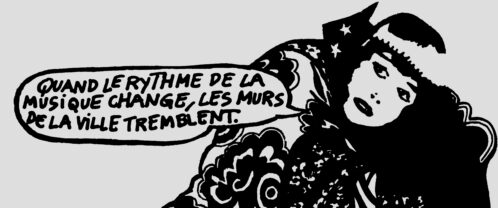
“When the mode of the music changes, the walls of the city shake” – Tuli Kupferberg via Plato. Magazine Actuel, March 1971.
The F.L.I.P. ceases to exist for fear to be utilized by radical leftist organizations, and it is necessary to gather the bands of the same protest line by another link. The “Front for Rock-Music Liberation” is created and Michel, one of the two guitarists of Komintern, writes the manifesto, inspired by the pamphlet of the situationist Mustapha Khayati “On the Poverty of Student life”, of which here is an extract: “Undisputedly Rock-Music, either through violence (of music, words or gestures), or through enormity and grotesque, puts itself in rupture with the dominant bourgeois culture. Rock-Music breaks the icy lethargy of urban areas, it is the scream of those who are afraid of dying of asphyxiation and inanition in the concentration camps of mediocrity, of those who, aware of the derisory poverty of reality, decided to eliminate it. In desire to play or to listen to it, Rock-Music emerge as a way of communication, everyone having the possibility to make it their own“. To Serge displeasure, the influence of the Situationist International is more and more felt by each of the band, particularly by Francis.
Komintern is then contacted, via Pathé-Marconi, for playing in the play “Bella Ciao or The Thousand Years War” written by Fernando Arrabal, being the most appropriate band to participate to it as musicians, actors and extras in view of its content: a critique of the dominant bourgeoisie, of the militarism and complicit media, enriched by revolutionary songs and an original music composed by André Chamoux. The poster of the play is drawn by the writer, illustrator, stage director and filmmaker Roland Topor.

Roland Topor’s artwork for the poster of the play Bella Caio.
The guitarists Pascal Chassin and Michel Muzac meet Fernando Arrabal at his place and, curiously, he doesn’t talk much about the play and doesn’t explain anything… Having a common passion for photography with Pascal, he shows a series of shots of his sex taken by his wife, which will be gathered in a picture book… Pascal and Michel, surprised, think that Arrabal leaved it to the stage director Jorge Lavelli to say more about the play.
But when the rehearsals start no one understand how the play is structured, what looks like military marches is tirelessly rehearsed (difficult for the members of the band, who all escaped military service!), all cast complain and Jorge Lavelli fails to control the situation, which leads to a rehearsal’s strike during about ten days: the ultimate paradox for a play which promote revolutionary ideas!
Furthermore the composer André Chamoux disappeared, despaired to see that neither Michel nor Pascal can read a musical score (Olivier a little, having played the piano when he was a child). Only Francis and Richard can, having studied in a music conservatory, but the proposed music doesn’t excite them more than the others. After some compromises and with the help of some “professional” musicians (there was a horn section) and the arranger Jean Morlier that Pascal had called, rehearsals restart and will last about two months.
The play will be performed for a month, between February 25 and march 25, 1972, on the big stage of the “Palais de Chaillot” of Paris, with for any decor two big trucks, on which one the amps are installed. The musical contribution of Komintern for the play was limited to a rather short jam and to a track played on the harmonica by Michel on the front stage while Olivier was reciting the stock exchange prices…
Pathé-Marconi considers the release of a single – under the name of Komintern—with a track from Bella Ciao, rather pop-rock and sung by a girl in the play. Serge and Francis are immediately opposed to this project and refuse to take part in it. A recording is made with Pascal, Olivier, Michel and other musicians who played in Bella Ciao but the result is inconclusive and the project falls apart.
After the performances of the play has ended all need to take a break and the motivations of each one start eroding. Serge leaves the band for different reasons, on which certainly the recent disagreement over Pathé-Marconi’s single’s project and the orientation, for him too situationist, taken by the band. Then Francis also leaves temporarily Komintern and, without a saxophone player, Richard becomes preponderant with his violin in the band.
In spring Komintern rehearses with different drummers, but replacing Serge and his explosive play is not easy. Michel is in contact with Gilles Yéprémian who is then manager of Lard Free. He introduces to the band the leader and drummer Gilbert Artman of Lard Free, which don’t have any concert or tour scheduled, taking holidays, and he also offers to manage the band, that falls at the right moment, times having change and being not so opportune to the concert’s proposals from the various student organizations or others.
The incidence of May 1968 is declining and the atmosphere of universities is somewhat serene. And Pathé-Marconi no longer offers anything.
The band, tired and somewhat unmotivated, don’t restart to go on tour immediately. It goes to rehearse and relax in a country house that Pascal can have, and then in a rehearsal space in Paris with the singer Annick Nozati who played in the play Bella Ciao. In summer 1972 Olivier and Pascal propose a project of second LP to Pathé-Marconi, with some tracks and a cover, which will be refused.

Relaxation and rehearsals in the countryside. Guitarist Pascal Chassin on soprano sax, Olivier Zdrzalik on drums, Michel Muzac on his guitar. (Photos: P. Chassin)
Pascal leaves the band at the end of October 1972 for financial reasons, having become a father, and Francis come back shortly after.
Komintern decides to add a second drummer to the band, Olivier thinking, as bass player, that binary drums have become necessary. Gilbert Artman, who is not opposed to this idea, introduces André Ghozland to the band, this one introducing Michel Bourzeix who becomes the Komintern’s sound engineer, but after a short time André and Michel switch roles. Gilbert Artman, who plays free, and Michel Bourzeix, who plays rock, both getting along well musically, will be the two drummers of the band.

Drummer Gilbert Artman (Photo: P. Chassin), drummer and sound engineer Michel Bourzeix.
Soon after Komintern goes on tour in South France and in Italy, invited by the communist Municipality of Bologne on January 20, 1973, on the occasion of its Biennale. At this period the band has a lot of gigs, mainly in the “Maisons des Jeunes et de la Culture” (Youth and Culture Centers), thanks to Gilles Yéprémian who is very efficient as a manager, and besides he will manage the world famous ensemble Urban Sax later.
In spring Komintern plays, among others, two times at the Palais des Sports in Paris:
- April 14, 1973: a benefit concert for Spanish prisoners with well known leftist French artists and bands. Some of Komintern decide to create a happening rather than giving a concert, what will be done without the violinist Richard Aubert and the drummer Michel Bourzeix who don’t agree and leave. After the show the participants at the happening go for dinner with situationist friends who were among the audience, during which they talk about a project of detourned songs, which interests particularly Francis, who will take part in it (like Olivier and Michel thereafter, but it is another story).
- May 2, 1973: a benefit concert for the National Greek Resistance with Arthur Brown, Pink Fairies, Pete Brown & Piblokto and Third World War. Richard has come back in the band, but not Michel Bourzeix. And Francis, who has lose interest in Komintern (a day he must join the others members by train for a gig but he doesn’t come) and who plays now only a few gigs, is not there either.
In summer Komintern is on holiday. In autumn it gives some concerts. Following the departure of its founding members Serge Catalano, Pascal Chassin and Francis Lemonnier, the band was progressively being emptied of any substance. Komintern splits towards the end of 1973.
Rock & Folk magazine had interviewed the band for the last time in june 1973. The article ends with these words:
R & F – In the track “Fou, Roi, Pantin” there is a sentence which explodes and really lights up people’s faces: “And everyone will get his own power”. Is it from Rimbaud ?
Komintern – No, it is from us.
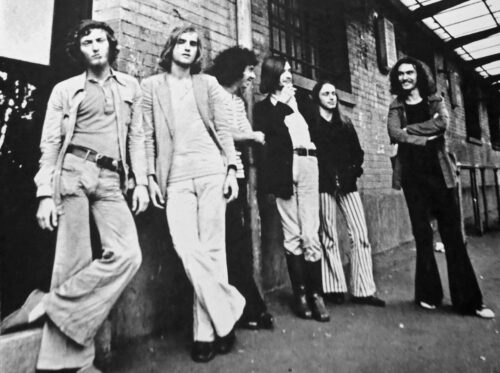
Komintern. L to R: Serge Catalano, Richard Aubert, Olivier Zdrzalik, Francis Lemonnier, Michel Muzac, Pascal Chassin (Photo: Philippe Gras).